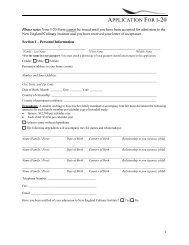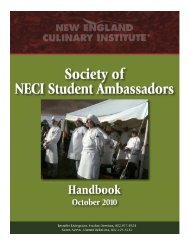Student Handbook - New England Culinary Institute
Student Handbook - New England Culinary Institute
Student Handbook - New England Culinary Institute
Create successful ePaper yourself
Turn your PDF publications into a flip-book with our unique Google optimized e-Paper software.
• Perusing a test before it is given<br />
Fabrication: Defined as intentional and<br />
unauthorized falsification, misrepresentation, or<br />
invention of any information, data, or citation in an<br />
academic exercise.<br />
Examples include:<br />
• Making up the data for a research paper<br />
• Altering the results of a lab experiment or<br />
survey<br />
• Listing a citation for a source not used<br />
• Stating an opinion as a scientifically proven<br />
fact<br />
Unauthorized Collaboration: This refers to<br />
instances in which students – each claiming sole<br />
authorship – submit separate reports that are<br />
substantially similar to one another. Specific<br />
faculty instructions regarding the need to do<br />
individual or group work must be followed.<br />
Participation in Academically Dishonest<br />
Activities: Participating or assisting in any manner<br />
in acts constituting academic dishonesty.<br />
Examples include:<br />
• Unapproved use of translators for language<br />
courses<br />
• Stealing an examination<br />
• Purchasing a pre-written paper through a<br />
mail-order or other service, including via the<br />
internet<br />
• Selling, loaning, or otherwise distributing<br />
materials for the purpose of cheating,<br />
plagiarism, or other academically dishonest<br />
acts<br />
• Alteration, theft, forgery, or destruction of<br />
academic work of other students, library<br />
materials, laboratory materials or academic<br />
records including transcripts, course<br />
registration cards, course syllabi, and<br />
examination<br />
• Intentionally missing an examination or<br />
assignment deadline to gain an unfair<br />
advantage.<br />
Instructors who suspect academic dishonesty will<br />
speak to the student to seek resolution, document<br />
the meeting and report the incident to the Academic<br />
Advising Office. If the dishonesty requires a more<br />
formal response, the Academic Advisor will<br />
promptly call an academic review consisting of<br />
faculty, the Program Department Chair, and/or<br />
other academic personnel. The Committee will<br />
make a recommendation regarding further<br />
disciplinary action. The student will receive the<br />
findings of that committee in writing from the<br />
Academic Advising office. The Director of<br />
Academic Services will handle any appeals from<br />
that decision.<br />
Depending on the severity of the offense, sanctions<br />
may include, but are not limited to, any<br />
combination of the following:<br />
• Written warning<br />
• Required resubmission of questionable work<br />
• Incomplete or zero grade on an assignment or in<br />
the course<br />
• Academic probation<br />
• Required retake of the class<br />
• Suspension for one or more terms<br />
• Dismissal<br />
All incidents of academic dishonesty are considered<br />
to be disciplinary violations and are recorded in the<br />
student’s academic file. At the discretion of the<br />
Department Chair, Academic Advisor or Director<br />
of Academic Services, repeat offenses will result in<br />
elevated consequences, up to and including<br />
suspension and dismissal.<br />
Judiciary Committee<br />
The Academic Advising office convenes this group<br />
on an as-needed basis. Each time a Judiciary<br />
Committee review is required, a representative of<br />
the Academics Department will select among<br />
members of the administration, faculty, and student<br />
population. <strong>Student</strong>s selected for this committee<br />
will receive training specific to maintaining<br />
confidentiality related to issues they are involved<br />
with. <strong>Student</strong>s will be nominated and selected for<br />
participation each term. The Committee is designed<br />
to review specific disciplinary or academic honesty<br />
concerns with students, and their role is advisory.<br />
Recommendations of the Committee are submitted<br />
to the Academics Department, which in conjunction<br />
with the Department Chair, makes a final decision<br />
on resolving issues.<br />
Rules of the Judiciary Committee:<br />
• The Committee will be guided by the guidelines<br />
for proper behavior which are contained in this<br />
handbook.<br />
• The Committee will not involve itself in matters<br />
related to the student’s specific academic<br />
standing.<br />
• In those instances where Committee members<br />
have personal connections to the situation, they<br />
will excuse themselves from the proceedings.<br />
Page 38






